The Premier League season is seven games in and with the transfer window closed until Jan. 1, there will be no more incomings or outgoings (unless a free agent can be snapped up.)
'
As teams start to hit their stride and new additions from the summer become accustomed to their surroundings, it's time to take a look at where the players stand in their respective squads.
Here are depth charts of the best options for the first XI and backup XI for the six most followed clubs in the league. Of course, it's hard to predict who could be called upon as the fixtures pile up, but this should give you an idea of how strong each team is.
(Note: Each player appears in the main squad list once, even if he could fit into multiple spots. We have also included injured players, though those likely to be out for the season are noted separately.)

ARSENAL
Goalkeeper: David Raya, Kepa Arrizabalaga, Tommy Setford
Right back: Jurriën Timber, Ben White
Left back: Riccardo Calafiori, Myles Lewis-Skelly
Center back: William Saliba, Gabriel, Cristhian Mosquera, Piero Hincapié
Central midfield: Declan Rice, Martín Zubimendi, Martin Ødegaard, Mikel Merino, Christian Nørgaard, Ethan Nwaneri, Eberechi Eze
Forward: Bukayo Saka, Gabriel Martinelli, Leandro Trossard, Noni Madueke, Max Dowman
Striker: Viktor Gyökeres, Gabriel Jesus, Kai Havertz
FIRST XI (4-3-3)
Raya
Timber - Saliba - Gabriel - Calafiori
Ødegaard - Zubimendi - Rice
Saka - Gyökeres - Madueke
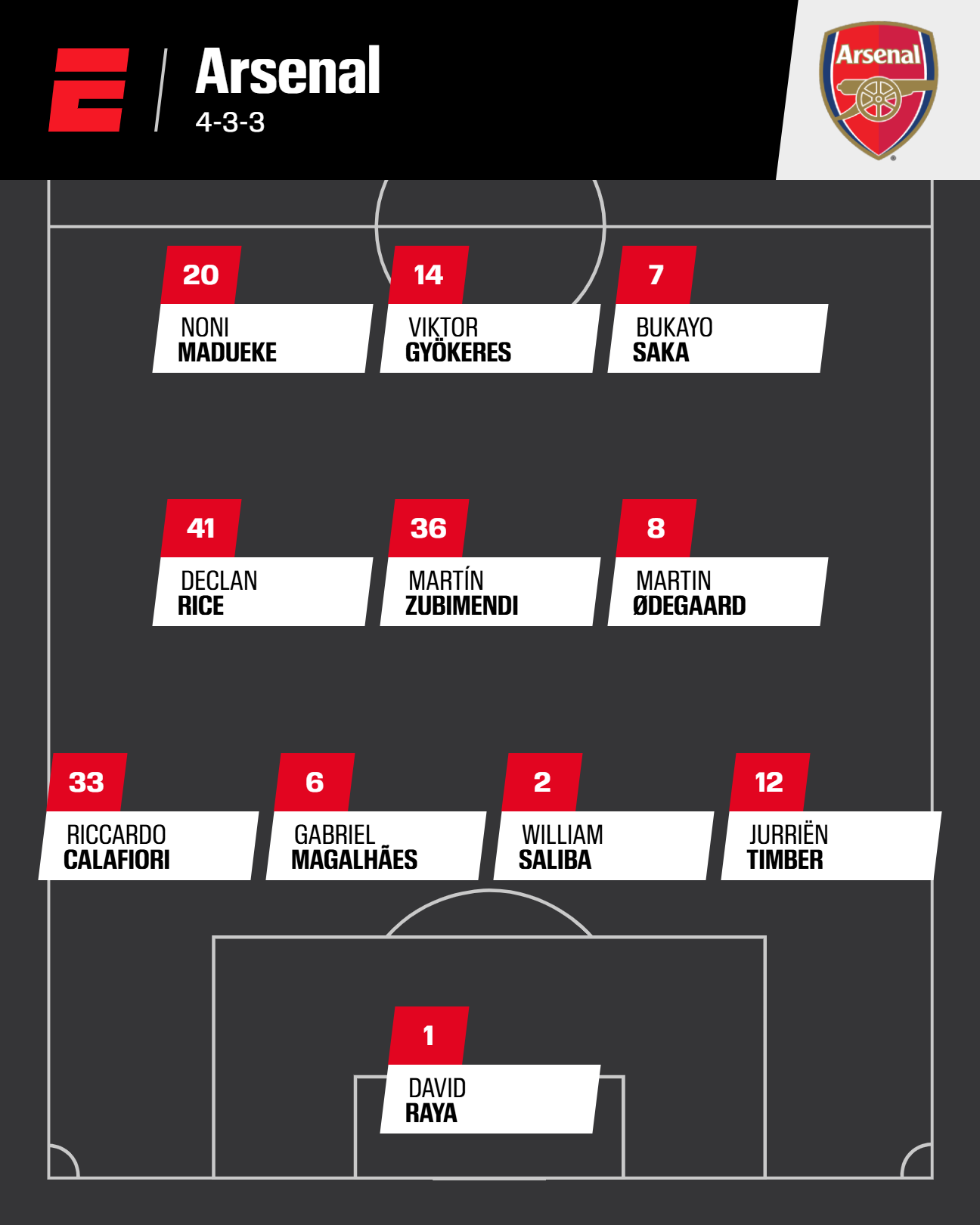
SECOND XI (4-3-3)
Arrizabalaga
White - Mosquera - Hincapié - Lewis-Skelly
Merino - Nørgaard - Eze
Trossard - Havertz - Martinelli
EXTRAS: Setford, Dowman, Nwaneri
LONG-TERM INJURY: Gabriel Jesus
Arsenal ended the summer transfer window looking markedly stronger. Midfielder Thomas Partey was the only established departure, with five elite internationals brought in and two credible competitors now for each starting spot.
Martin Zubimendi is the clearest like-for-like upgrade in the No. 6 midfield role, giving manager Mikel Arteta a press-resistant, deep playmaker. Eberechi Eze and Piero Hincapié were also eye-catching additions, and striker Viktor Gyökeres finally answers the long-running call for an out-and-out No. 9 with his tenacity, penalty box presence and goal threat. Kai Havertz can also now drop into a deeper role when required, adding height and timing to the second wave of attacks.
Versatility is a theme throughout the squad. While Myles Lewis-Skelly covers left back and holding midfield with equal high-level input, Riccardo Calafiori, Hincapié and Jurrien Timber are comfortable both at left back and center back, allowing Arsenal to alternate their build-up patterns.
Midfielders Mikel Merino and Eze can operate as advanced No. 8s or between the lines, complementing Martin Ødegaard's orchestration and Declan Rice's ball-winning range. Out wide, Noni Madueke also adds options to an already strong line of wide forwards, though has now suffered an injury. And, on top of that that, academy graduates Max Dowman (15) and Ethan Nwaneri (18) offer game-changing qualities off the bench.
Though cohesion may take some time to establish, when it comes to depth, balance and tactical flexibility, Arsenal now look built to contest silverware on every front.

CHELSEA
Goalkeeper: Robert Sánchez, Filip Jørgensen, Gabriel Slonina
Right back: Reece James, Malo Gusto, Josh Acheampong
Left back: Marc Cucurella, Jorrel Hato
Center back: Levi Colwill, Benoît Badiashile, Wesley Fofana, Trevoh Chalobah, Tosin Adarabioyo
Central midfield: Enzo Fernández, Moisés Caicedo, Romeo Lavia, Andrey Santos, Dário Essugo, Cole Palmer, Facundo Buonanotte
Forward: Pedro Neto, Cole Palmer, Jamie Gittens, Mykhailo Mudryk, Estevao, Tyrique George
Striker: João Pedro, Liam Delap
FIRST XI (4-2-3-1)
Sanchez
James - Adarabioyo - Chalobah - Cucurella
Fernandez - Caicedo
Estevao - Palmer - Neto
Joao Pedro
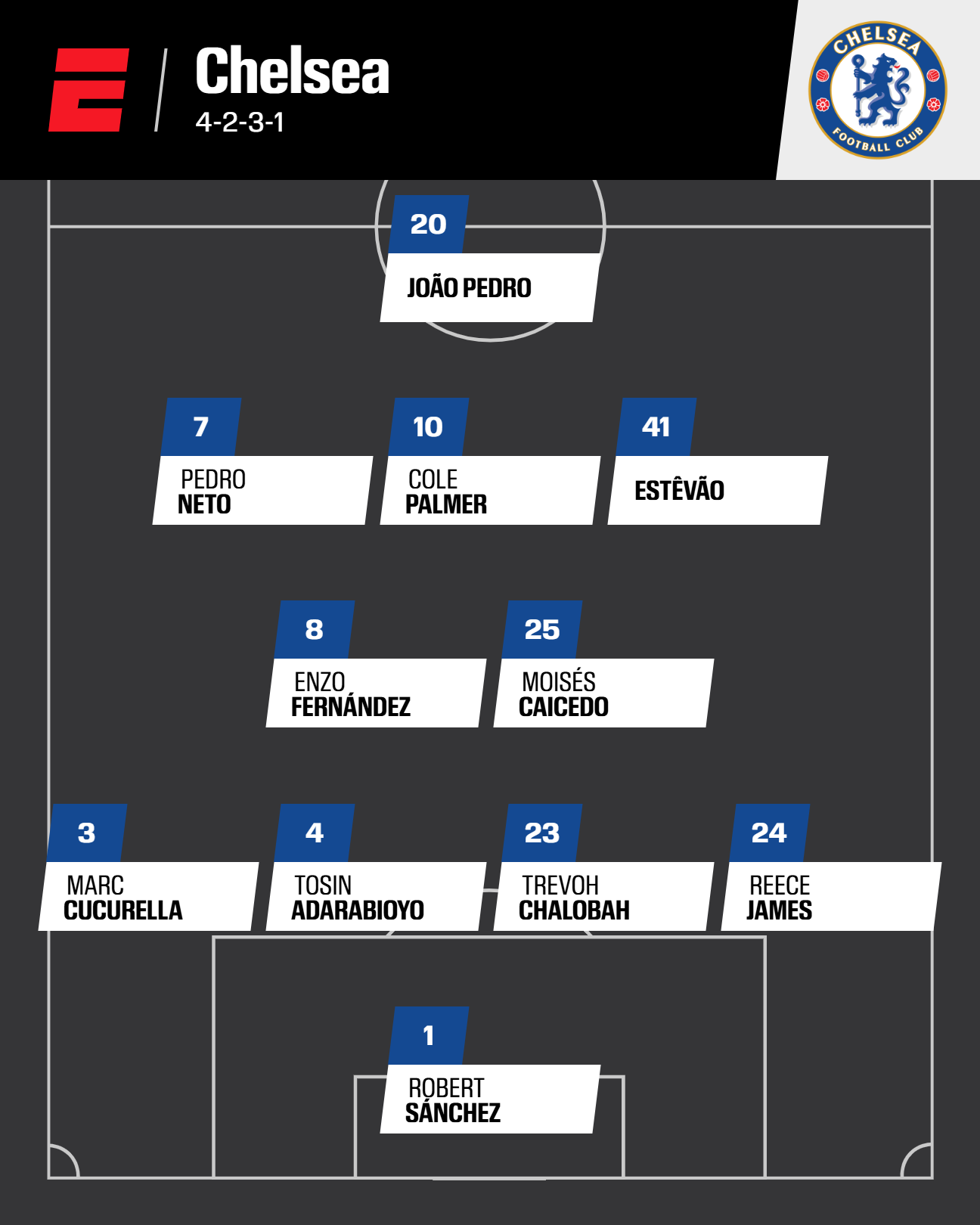
SECOND XI (4-2-3-1)
Jørgensen
Gusto - Fofana - Badiashile - Hato
Andrey Santos - Lavia
Gittens - Buonanotte - Garnacho
Delap
EXTRAS: Slonina, Essugo, George.
LONG-TERM INJURY: Levi Colwill.
LONG-TERM ABSENTEES / INACTIVE: Disasi, Mudryk, Sterling.
A certain level of stability has finally arrived after over £2 billion of spending and years of chopping and changing, but right now injuries -- and a couple of internal decisions -- are testing the squad depth. A defensive crisis (and, to a lesser extent, one up front), plus Raheem Sterling, Axel Disasi and Mykhailo Mudryk being frozen out, has also complicated matters.
The first choices in central defense were edging toward clarity after the Club World Cup, only for Levi Colwill's long-term absence to force changes. It's now a priority is to find a preferred pairing and, until then, the defensive line will feel patched together. By contrast, the full backs are quality starters and Chelsea have competent cover on both sides. The fact that Malo Gusto isn't a certain starter proves that point.
In midfield, the double pivot is already well-established and high-performing. Enzo Fernández and Moisés Caicedo offer control in possession, energy and defensive bite. They are arguably the league's top duo on paper, which means there is a drop in performance when either is missing. While Andrey Santos is a brilliant player, he's still learning the trade at this level, and Romeo Lavia's fitness is an issue.
Further forward, the talent is undoubtedly there, even if the cohesion is a work in progress. Summer signings Alejandro Garnacho and Jamie Gittens are still finding their feet at Chelsea, but provide elite competition to Pedro Neto and Estevao for the inverted-winger slots. Up front, Liam Delap's physicality and directness blends in nicely with Joao Pedro's more-technical skill set.
Despite the issues, manager Enzo Maresca has enough quality to compete on multiple fronts. Yet the key elements to succeed are settling the center back partnership, keeping the double pivot on the pitch and accelerating the adaptation of the new wide forwards -- the signs are certainly promising, given Estevao's magnificent start.

LIVERPOOL
Goalkeeper: Alisson Becker, Giorgi Mamardashvili, Freddie Woodman
Right back: Jeremie Frimpong, Conor Bradley
Left back: Andy Robertson, Milos Kerkez
Center back: Virgil van Dijk, Ibrahima Konaté, Joe Gomez, Giovanni Leoni
Central midfield: Alexis Mac Allister, Dominik Szoboszlai, Curtis Jones, Wataru Endo, Ryan Gravenberch, Stefan Bajcetic, Florian Wirtz
Forward: Mohamed Salah, Cody Gakpo, Federico Chiesa, Rio Ngumoha
Striker: Alexander Isak, Hugo Ekitike
FIRST XI (4-2-3-1)
Alisson
Frimpong - Konate - Van Dijk - Kerkez
Mac Allister - Gravenberch
Salah - Wirtz - Gakpo
Isak
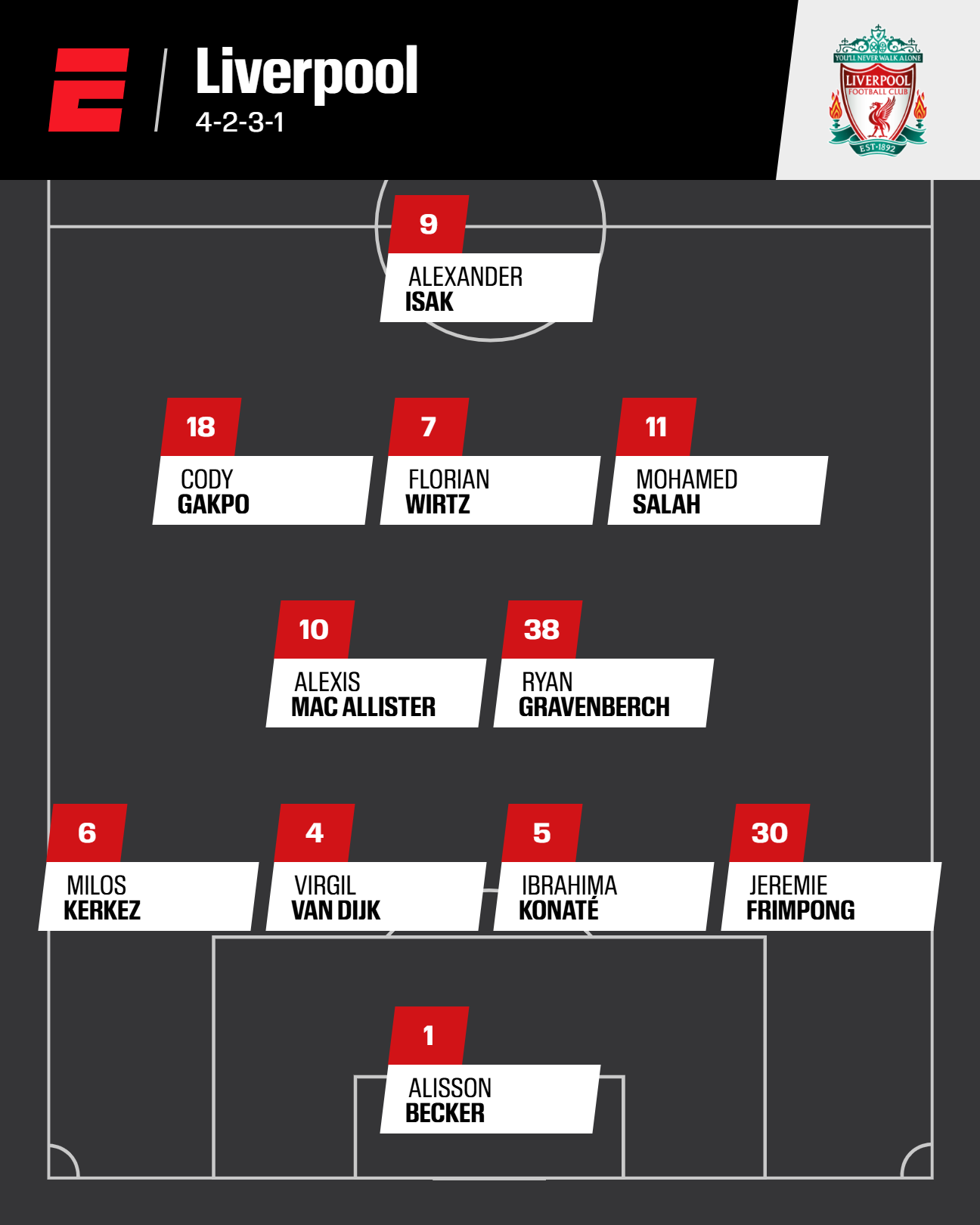
SECOND XI (4-2-3-1)
Mamardashvili
Bradley - Gomez - Leoni - Robertson
Endo - Jones
Ngumoha - Szoboszlai - Chiesa
Ekitike
EXTRAS: Bajetic
Champions Liverpool were already in a position of strength, but spent over £450 million to bring in five high-profile additions this summer. Their start to the season has been wobbly. Still, there's tremendous potential in the squad and the challenge is to get the new names properly bedded in.
With Alisson still the trusted No. 1 -- and arguably the most complete goalkeeper in the world -- Giorgi Mamardashvili gives Liverpool a valid second option. Yet, judging from his debut (and from Valencia), there's room for improvement when it comes to distribution and there's little reason to believe that the Georgia international will threaten Alisson for the starting spot this season if he's not injured.
While pace and energy have been a staple of Liverpool's full backs during the recent seasons, there's even more of that to come as the new pair settles in. Jeremie Frimpong and Milos Kerkez were clearly brought in to be starters and should add significant attacking output -- providing width, underlaps and relentless running power in the final third -- with Andy Robertson and Conor Bradley high-level cover.
Centrally, Liverpool's summer interest in Crystal Palace's Marc Guéhi shows they would have liked even more strength in depth. Virgil van Dijk and Ibrahima Konaté are one of the best partnerships there is, but neither Joe Gomez nor Giovanni Leoni can provide the same sky-high standards, and the 18-year-old Leoni recently tore his ACL. If Liverpool lose either of their starting central defenders, their solidity will be compromised.
The double midfield pivot -- Alexis Mac Allister and Ryan Gravenberch -- was brilliant last season, with Curtis Jones and Wataru Endo reliable rotation ... though Gravenberch's creativity deep in midfield can't be easily replaced. Higher up the pitch, £100 million new signing Florian Wirtz will need minutes to adjust to the pace of the Premier League, and though Dominik Szoboszlai is versatile and highly useful, Liverpool haven't quite been able to keep up last year's momentum. Hugo Ekitike has shown some encouraging early signs, as has 16-year-old winger Rio Ngumoha, but £150 million arrival Alexander Isak hasn't hit the ground running and Mohamed Salah's patchy start to the season is a real worry.
Regardless of their shaky start, Liverpool have built their squad meticulously by reinforcing several areas that were already functioning well. With a bit of patience, they should be devastating.

MANCHESTER CITY
Goalkeeper: Gianluigi Donnarumma, James Trafford, Stefan Ortega
Right back: Rico Lewis
Left back: Rayan Aït-Nouri,
Center back: Rúben Dias, John Stones, Nathan Aké, Joško Gvardiol, Abdukodir Khusanov
Central midfield: Rodri, Mateo Kovacic, Tijjani Reijnders, Nico González, Nico O'Reilly, Bernardo Silva, Matheus Nunes, , Kalvin Phillips
Forward: Phil Foden, Jérémy Doku, Savinho, Rayan Cherki, Oscar Bobb
Striker: Erling Haaland, Omar Marmoush
FIRST XI (4-1-4-1)
Donnarumma
Matheus Nunes - Dias - Gvardiol - Aït-Nouri
Rodri
Foden - Bernardo Silva - Reijnders - Doku
Haaland
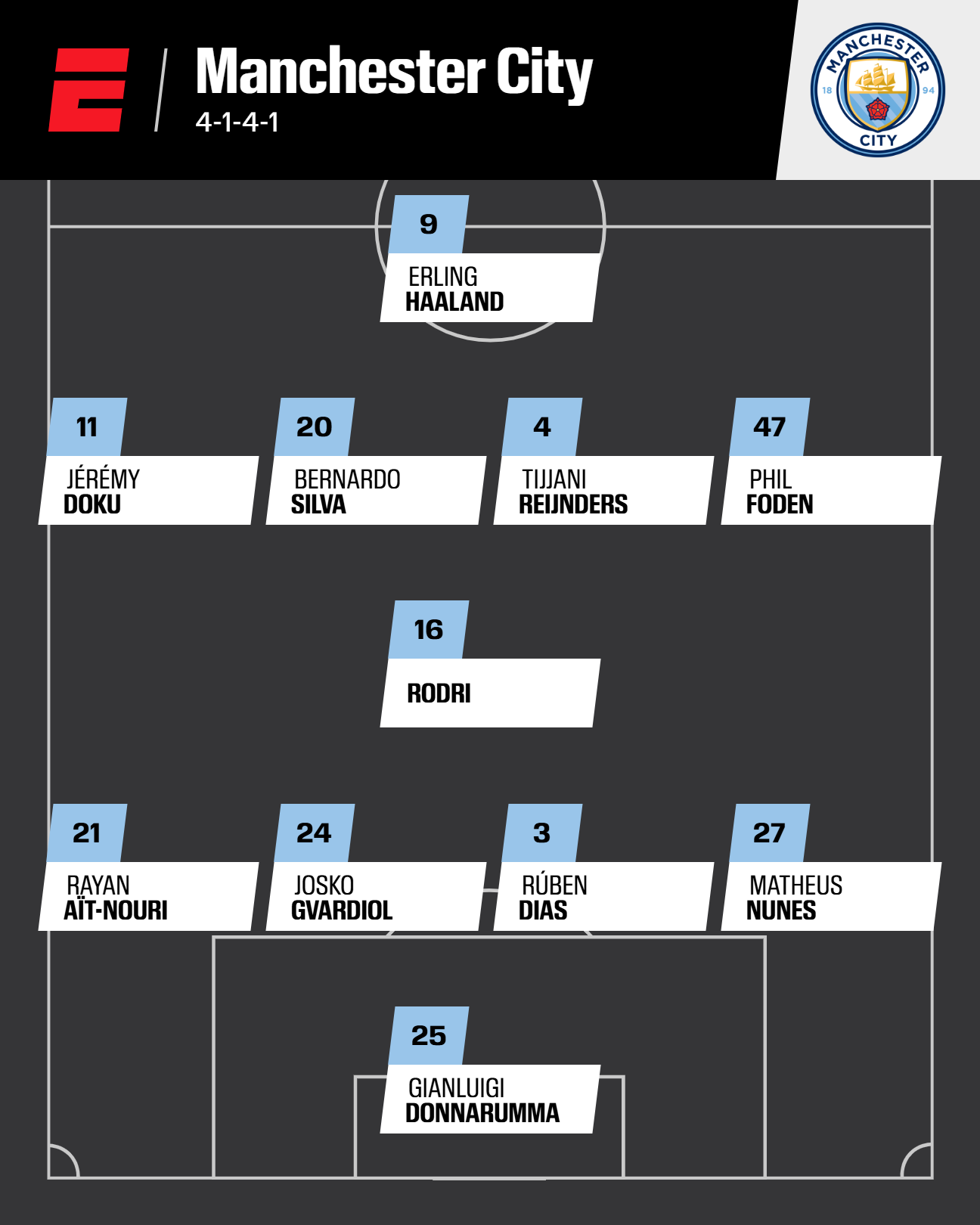
SECOND XI (4-1-4-1)
Trafford
Khusanov - Stones - Aké - O'Reilly
Nico Gonzalez
Savinho - Kovacic - Cherki - Bobb
Marmoush
EXTRAS: Ortega, Phillips, Lewis
Given Pep Guardiola's insistence on keeping a small squad, it's ironic that, after a very busy summer window, he has ended up with a more abundant group than at any other point during his tenure. But with his unique perception of roles and characteristics, Guardiola will ensure his side is among the most versatile out there.
Signing goalkeeper Gianluigi Donnarumma, just weeks after spending £25 million to sign James Trafford, was a likely result of an opportunity rather than planning. Yet the outcome is a huge upgrade on last season as Ederson headed out to Fenerbahçe.
The options in the defensive line also open up a variety of scenarios. At right back there's Khusanov when duel prowess and recovery speed are needed, Matheus Cunha for possession-heavy encounters, and Rico Lewis for the underlapping variation. Having four left-footed defenders (including Nico O'Reilly, who can easily slot in at left back) is also a luxury.
With 2024 Ballon d'Or winner Rodri back in central midfield, Nico Gonzalez provides decent cover at No. 6. There's also Mateo Kovacic to turn to for most tasks in the middle of the park or if reverting to a double pivot. Five brilliant dribblers competing for two winger roles is also more than sufficient, and Guardiola does like to change his wide men after 75% of games, so they will all get minutes. The obvious shortcoming of not having a proper central striker to take some pressure off Erling Haaland -- although he hates to be substituted -- was fixed in January with the £70 million arrival of Omar Marmoush.
In essence, following their two-window revamp, City have a more complete squad that a year ago, but the question remains whether there's enough world-class quality throughout the team to fight for another Premier League or Champions League title this season.

MANCHESTER UNITED
Goalkeeper: Altay Bayindir, Senne Lammens, Tom Heaton
Right back: Diogo Dalot, Noussair Mazraoui
Left back: Luke Shaw, Tyrell Malacia, Patrick Dorgu, Diego León
Center back: Matthijs de Ligt, Harry Maguire, Lisandro Martínez, Ayden Heaven
Central midfield: Casemiro, Bruno Fernandes, Mason Mount, Manuel Ugarte, Kobbie Mainoo
Forward: Amad, Bryan Mbeumo, Matheus Cunha
Striker: Benjamin Sesko, Joshua Zirkzee, Chido Obi
FIRST XI (3-4-2-1)
Bayindir
Yoro - De Ligt - Martinez
Dalot - Fernandes - Ugarte - Dorgu
Cunha - Mbuemo
Sesko
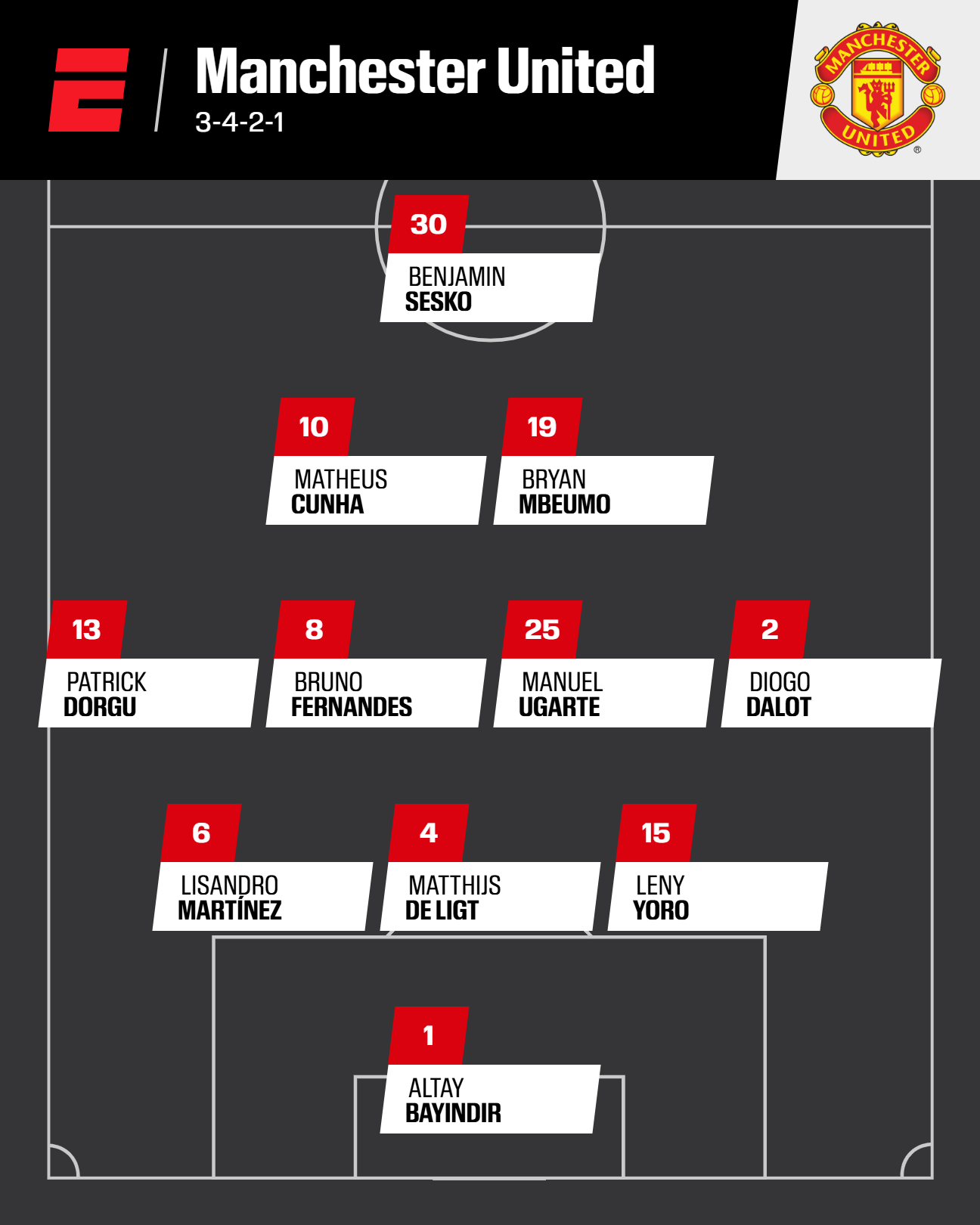
SECOND XI (3-4-2-1)
Lammens
Maguire - Heaven - Shaw
Mazraoui - Mainoo - Casemiro - León
Amad - Mount
Zirkzee
EXTRAS: Heaton, Obi
LONG-TERM INJURY: Malacia
Manchester United emerge from another lavish summer -- with around £200 million spent -- still a work in progress. Ruben Amorim's squad is arguably stronger, particularly up front, yet the manager's insistence on sticking to his 3-4-2-1 system keeps the puzzle complicated. While the wing back dilemma has somewhat edged toward balance (there are at least three defined options now), misalignments remain, or have popped up elsewhere.
Midfield remains the headline issue. Despite seasons of evidence, no new summer recruit arrived to add stamina, tenacity, or defensive coverage across the system's most vulnerable zone. The consequence is a cascade of challenges: namely, that star player Bruno Fernandes is pulled closer to the buildup, reducing his impact as an "No. 8½" and final-third force. United still possess hybrid midfielders with technical ability rather than the pure ball-winners or destroyers the structure cries out for.
At center back, Lisandro Martínez's recurrent absences remove the distributor and proactive defender the setup relies upon (with left back Luke Shaw being relied upon instead) and there is no like-for-like cover to replicate his quality. Cohesion suffers, and the line oscillates between competent and shaky under pressure.
The bright spot is the front line. A summer spending spree saw United splash most of their money on signing Matheus Cunha, Benjamin Sesko and Bryan Mbeumo, and while that adds speed, physicality and finishing skill to the starting XI, it also complicates things. Their compatibility with each other and the system is still lacking, so at least one of them would be more useful as a rhythm changer off the bench. Furthermore, the attacking output logically remains tied to the platform behind it -- supply, timing, and structure -- which currently points to greater effectiveness in transition. Until those structural weaknesses are addressed, their summer's work reads as incremental rather than decisive.

TOTTENHAM HOTSPUR
Goalkeeper: Guglielmo Vicario, Antonin Kinsky, Brandon Austin
Right back: Pedro Porro, Djed Spence
Left back: Destiny Udogie, Ben Davies
Center back: Cristian Romero, Micky van de Ven, Radu Dragușin, Kevin Danso, Kota Takai
Central midfield: João Palhinha, Yves Bissouma, Rodrigo Bentancur, Pape Matar Sarr, James Maddison, Archie Gray, Lucas Bergvall
Forward: Dejan Kulusevski, Brennan Johnson, Wilson Odobert, Mohammed Kudus, Xavi Simons
Striker: Dominic Solanke, Richarlison, Randal Kolo Muani, Mathys Tel
FIRST XI (4-2-3-1)
Vicario
Porro - Romero - Van de Ven - Udogie
Bentancur - Palhinha
Kulusevski - Simons - Kudus
Solanke
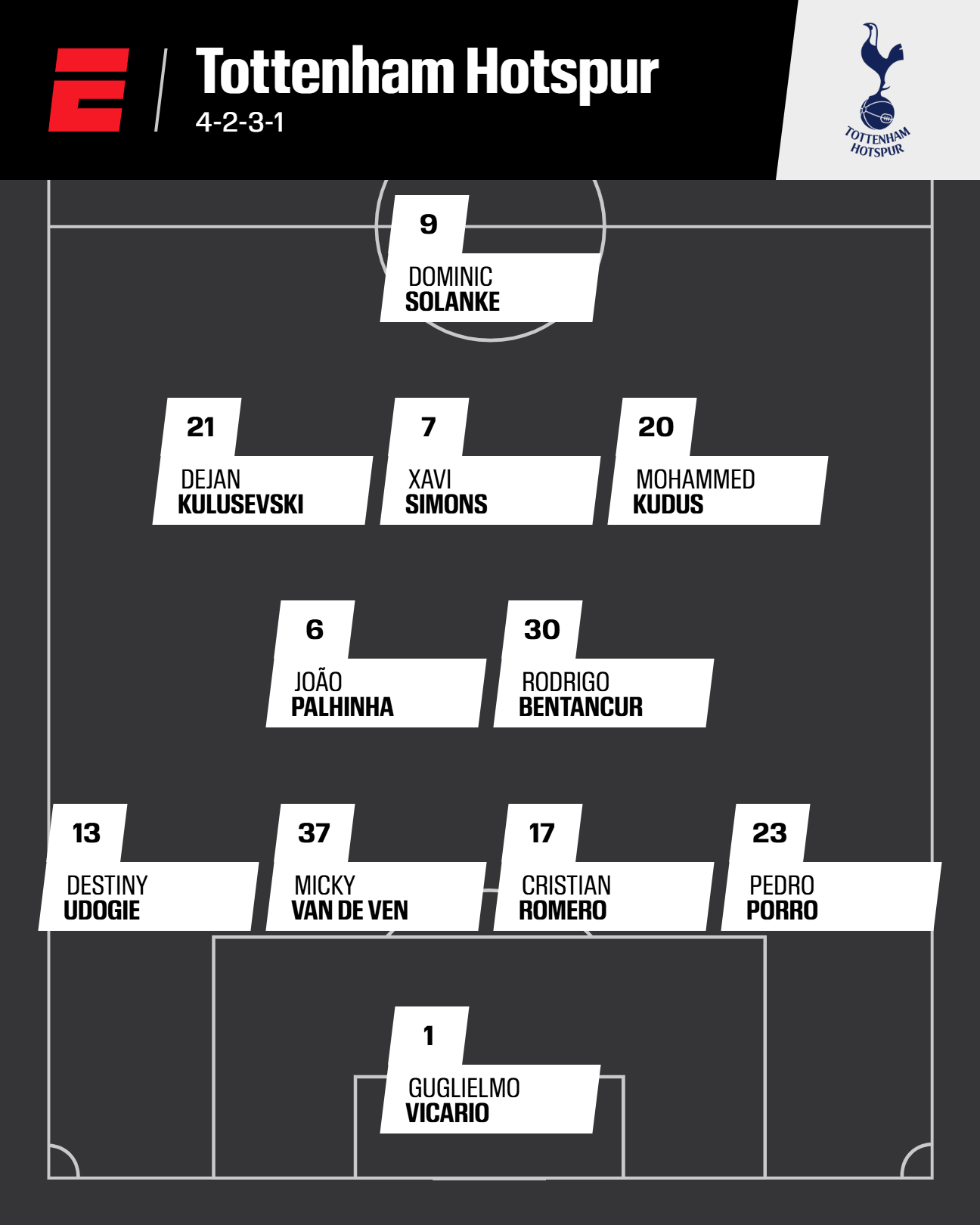
SECOND XI (4-2-3-1)
Kinsky
Gray - Danso - Dragusin - Spence
Bergvall - Bissouma
Johnson - Sarr - Richarlison
Kolo Muani
EXTRAS: Austin, Davies, Takai, Odobert, Tel
LONG-TERM INJURIES: Bissouma, Maddison
Calling this the most competitive Spurs squad of the modern era is not a stretch, though their current injury predicament is masking the real depth. New boss Thomas Frank has a large, fresh and talented group -- evenly divided position-wise -- at his disposal, and the rearguard alone (goalkeepers included) features 10 full internationals. Sure, availability has haunted them over the past year and, yes, losing center backs Cristian Romero or Micky van de Ven -- too frequent a theme last season -- still triggers an immediate drop in quality, but that first-choice pairing remains among the Premier League's elite.
If the midfield and attack stay injury-free, the selection puzzle will only grow. While characteristics differ, standards don't as Pape Matar Sarr, Lucas Bergvall, Joao Palhinha, Yves Bissouma and Rodrigo Bentancur can all claim to be ready to start games. Under the 4-2-3-1, with a dedicated No. 10, only two of that quintet can start, which makes the "First XI" a moving target.
The same pattern holds out wide. Dejan Kulusevski, Brennan Johnson, Mohammed Kudus and Wilson Odobert bring distinct threats -- ball progression, creativity and one-on-one proficiency -- and rotation is simpler here given changes up front are pretty standard after the hour.
The fight for the No. 9 striker role is also a proper battle. With just one place left to lead the line, the question is which profile Frank prefers: Richarlison's aggression, Dominic Solanke's hold-up and link-up play, Randal Kolo Muani's runs in behind and movement, or Mathys Tel's explosiveness. Injuries aside, this is a deep squad with quality starters and genuine competition for places, which in theory should allow them to fight for a Champions League spot and not languish toward the end of the table as they did last season.
